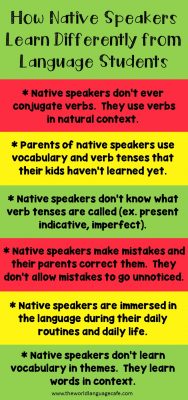When I applied for a teaching position this month, I realized how much my language teaching philosophy has changed as a result of raising my own kids bilingually. You may be surprised to learn that native speakers learn differently than language students.
Here are some differences I’ve noticed of how native speakers learn a language and how many language teachers teach:

Why native speakers learn differently than language students.
When we learn our native languages, we never conjugate verbs
We definitely don’t sit around the dinner table talking about verb tenses! So why do we spend so much time doing this in class?
As parents, we don’t tell our kids that we can’t talk to them about what we did yesterday because they haven’t learned the past tense yet.
We incorporate complex vocabulary, grammar, and verb tenses in our daily language because that is how people speak naturally.
Parents correct their kids when they make mistakes in the language.
We don’t say, “I don’t want to hurt my son’s feelings because he’s saying it wrong.” We just gently correct the child by saying it correctly and having them repeat it correctly.
Often, parents speak to the child all in one language.
Some parents do a one-parent, one language approach. One parent speaks one language and the other parent speaks a different language. Why is this? Because it’s really hard for your brain to switch between languages until you have reached a certain level of fluency.
It’s very difficult to replicate the repetition that you get as a native speaker with your parents speaking to you 24 hours a day when as teachers, we often only have between 1 and 5 hours a week with our students.
There just isn’t enough time!
Hope you found this article about how native speakers learn differently helpful. Read more about how to teach languages more effectively using my hybrid system (how native speakers learn, squeezed into 1-5 hours a week for maximum impact) in How to Teach Tricky Verbs and Grammar, Part 1.





5 Comments
Elaine
September 15, 2017 at 8:52 pmYou have no idea how much I appreciate your information. I have a colleague who I want to request a Spanish class only for native speakers. She Has a lot of problems with some Hispanic students using words that for her aren’t even correct. Being a native Spanish speaking and a teacher her comments sounds offensive and disrespectful to me too.
Sherry Sebesta
October 24, 2021 at 8:01 pmSo happy to hear that you liked the post! Just keep doing the best you can in your classroom with your students bc it’s too hard to try to convince other teachers to do things that they’re resistant to. Hang in there!
Getting Students to Speak in the Target Language in Class
March 4, 2018 at 4:58 pm[…] How Native Speakers Learn Differently than Language Students How to Teach Tricky Verb Tenses and Grammar 20 Ways to Get your Students Speaking in the Target Language Reward Ideas High School Students World Language Cafe Free Resource Library (French and Spanish) The World Language Cafe facebook page and group. […]
Dana Harripersad
October 24, 2021 at 5:40 pmThanks for sharing this valuable information !
Sherry Sebesta
October 24, 2021 at 7:59 pmSo happy to hear you found it helpful!